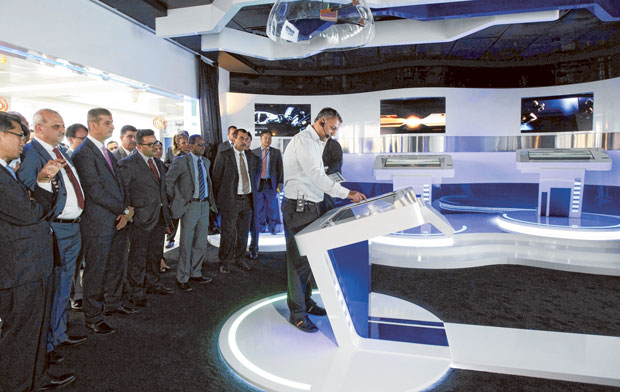
Dubai; Today’s car buyers are just as likely to have made up their minds on what they are buying well before setting foot in a showroom. With all possible details available in digital and social media realms, they only need to make up their minds on what to buy and when.
But a UAE dealership is not about to let all of the decisions be made in the virtual space. The Juma Al Majid Group, the Hyundai importer, has just lifted the veils on the ‘DigitalStudio’ at its flagship showroom in Dubai, which lets prospective buyers mix-and-match check out the specs and how their preferred models would look like in various shades on giant screens mounted within the showroom. Five terminals have been put in place at the showroom, and based on feedback, the dealership will look to introduce it at some of its other locations as well.
“It’s about engaging with a customer the moment he steps into a showroom; they don’t need to wait until a sales staff approaches them to take them through the details,” said Khalid Eisa, Chief Operating Officer at the Juma Al Majid Group. “They can pick and choose between the many options each Hyundai model comes in, be it on the engine specs, pricing, colour options, etc.
“Sure, these days a lot of the decisions are made beforehand via what car owners see on the online world, but there are still opportunities within a showroom environment to engage with buyers. It’s also why auto showrooms cannot remain static to trends that are visible online.
“By debuting with the DigitalStudio, we are creating an alternative for buyers to have a feel of what they want to drive. And once that decision is made, it’s just a small step towards going for a trial run.”
The Group tapped in-house resources for the tools to make it happen. The software, which did require extensive customising, was done internally and so was the fitout. It also helped that the Group could call on its association with Samsung Gulf for the screens.
On whether creating the digital interface meant less reliance on staffers to do their part, Eisa said: “That’s not the way it’s been conceived. The human element is still just as vital in the car buying and selling process. What we have done is add a new layer before it gets to that point.”
More than 20,000 Hyundai units are sold in the local market, and Issa believes the growth momentum can be maintained into the new year. “The yen’s decline has given Japanese manufacturers an advantage and not limited to the auto industry,” he added. “This has created an extremely price sensitive market conditions in categories such as fleet sales where they can use the soft yen to their advantage.
“However, we have taken preventive measures to counter the currency-led situation ... such adjustments are paying off in maintaining Hyundai’s visibility.”












